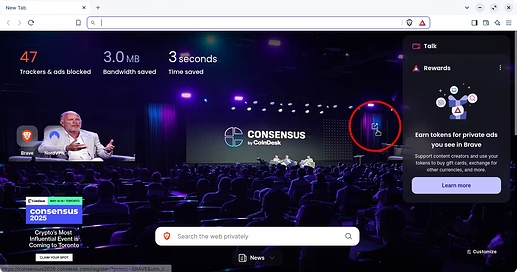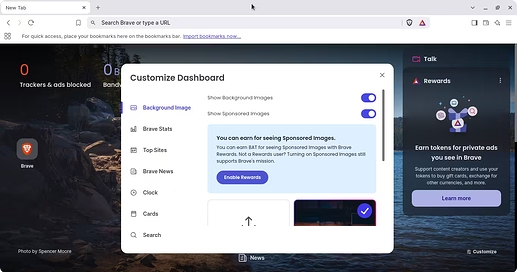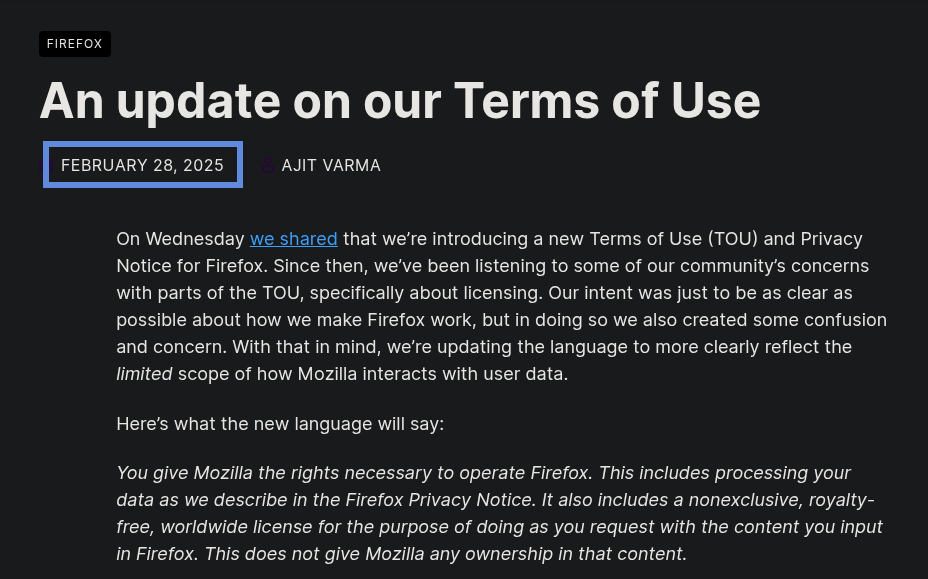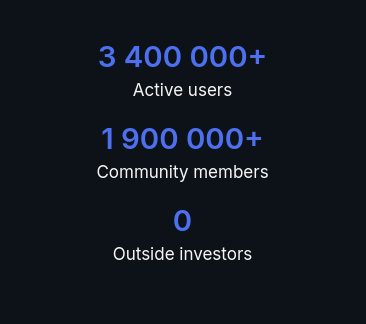I'm also curious about your browser of choice, if you don't mind sharing. I have found that using more than one is always a good idea, if nothing else to have a backup plan if things go south.
As for your concerns regarding privacy, I took the time to read through that article and I have to say that I'm not very impressed. Let me share some thoughts:
2016 — Brave Browser promises to replace webpage ads
This feature that is being criticized would actually make the end user's experience more private. Ads today are more than just a reserved space for companies to put a banner on. They are silently interactive with the website in which they are injected, and continuously track your behavior, even across multiple domains. Blocking them is the only way to protect the user's privacy.
Brave's strategy consists in placing ads while providing an alternative that still brings revenue to the website and the advertiser. But, regardless of what Brave does or doesn't do afterward, blocking the ad increases privacy. Claiming that Brave is private for blocking ads makes no sense.
If the intent of this point is to highlight how unethical Brave is for taking away website's ability to generate revenue, I think it's pretty obvious to anyone in 2025 that the use of ad blockers has exploded over the past decade. In the worst case scenario, Brave would've been giving a fair chance of slowing down this trend.
In case you're unaware of how Brave's ads work: they are downloaded on the user's device upfront, and served from the device locally. This way, the advertiser wouldn't have been able to track the user's very move. But, again, the trend was and still is to block ads altogether, and Brave does that anyway so...
2020 — Brave injects referral links when visiting crypto wallets
To be clear, it was the same referral code for everyone, because it was hard-wired to identify the browser. This means that as far as privacy goes, the only piece of information that was leaked was the fact that the user was using Brave browser.
I'm not saying that this was okay, but this wasn't as bad as Luca (the author of the article you linked to) makes it sound like. And, it was promptly addressed and fixed.
By the way, pretty ironic that every single link in the article has a referral link attached to it, while complaining about that referral links.
2020 — Brave puts ads in user's home screens
The main criticism here seems to be with how Brave decided to use the Home and New Tab pages to advertise their own features (Brave Rewards). Fair enough, but there's no invasion of privacy here, it's just a background image. There are no ads unless you enable them explicitly.
I stand corrected, it looks like there are links in some places on the image:
However, contrary to the claims on the article, it can be turned off through the Customize button on the lower right:
Despite the chance of clicking on this accidentally, I still maintain that this isn't a huge deal. Particularly if this is disabled by default in Zorin OS, which I believe it is (my VM was upgraded from 17.2).
I should also mention that Mozilla has been using this same space to promote their own (Pocket) and sponsored content. The difference being that Brave Rewards is disabled by default, and Firefox's Pocket and sponsored content aren't.
It seems to me that if this point is one of the reasons you are leaving Zorin OS, you are walking in the wrong direction.
2021 - Brave ships an insecure Tor feature
I wish things like this never happened to any browser. Since this is impossible (all software has bugs) the next best thing we can ask for is for them to be fixed quickly.
Sure enough, the very article cited as the source of this news contains the following update:
Update: Minutes after this article went live, the Brave team announced a formal fix on Twitter.
2024 - So-called "privacy browser" deprecated advanced fingerprinting protection
The criticism here seems to be that Brave removed a feature that made ad blockers so aggressive that a lot of websites weren't working properly, if at all.
Again, fair enough, this technically reduces the number of options that users have to protect their privacy. However, it's important to understand how browser fingerprint works, in order to understand why this decision was made.
What this article conveniently neglects to report is the number of users that are actually affected by this decision, and how. Very surprising, in fact, considering that the screenshot they are using is taken from an article with the following text:
Another issue is that Strict mode is used by roughly 0.5% of Brave's users, with the rest using the default setting, which is the Standard mode.
This low percentage actually makes these users more vulnerable to fingerprinting despite them using the more aggressive blocker, because they constitute a discernible subset of users standing out from the rest.
Speaking of being untrustworthy ![]()






